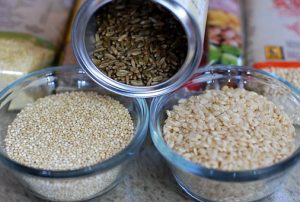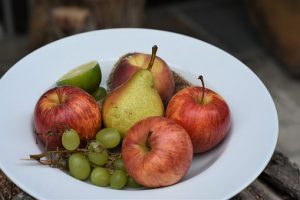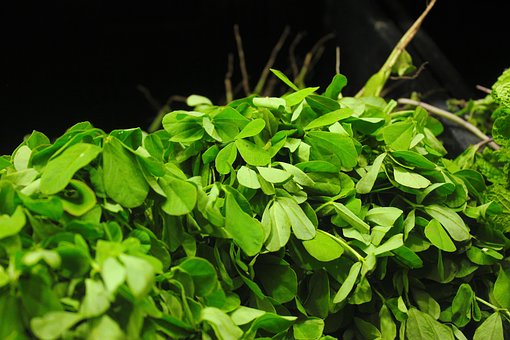Dietary fiber is found naturally in foods
Women need 35 grams per day while men need 40 grams
- lowers total & LDL cholesterol
- regulates blood sugar
- balances intestinal pH
- speeds passage of food through the digestive system
- reduces the risk of colon cancer
By eating more plant-based foods, you’ll naturally increase your fiber intake. But doing this can cause some discomfort as your gut bacteria adjust to the naturally high fiber in plant foods. Don’t let that deter you. Your body just needs some time to adjust. Learn more about the possible side-effects and what to do to alleviate them: Fiber & Tummy Discomfort
Insoluble Fiber
 This gives stool its bulk and speeds its passage through the gut, therefore regulating bowel function
This gives stool its bulk and speeds its passage through the gut, therefore regulating bowel function
- does not dissolve in water
- helps food move through the digestive system and promotes bowel regularity
- contained in barley, brown rice, bulgur, couscous, fruit peels of apples, blueberries & grapes, nuts, seeds, veggies, wheat bran, whole grains
Soluble Fibre
 This slows digestion to decrease the absorption of starch and sugar
This slows digestion to decrease the absorption of starch and sugar
- drink lots of water for fiber to absorb
- reduces appetite & promotes effective weight loss
- stabilizes blood sugar control
- increases insulin sensitivity
- lowers blood cholesterol and triglycerides
- contained in psyllium husk, oatmeal, soft flesh of fruits like apples, oranges and pears, dried beans, peas, lentils, nuts & flaxseed
Good Sources of fiber:
- Fenugreek (pictured above) has 100% daily required fibre in 100g of seeds! This is a member of the bean family: use whole or ground seeds in breads, chutneys, curry powders, as a condiment or as a herb tea
- Freekeh has 4 times the fibre of brown rice
- Asparagus, baked potato with skin, barley, Butter beans, Cannellini beans, chia seeds, chickpeas, Dandelion Greens, Fiddleheads, fruit, ground flaxseed, legumes, navy beans, nuts, oatmeal, psyllium, Quinoa


